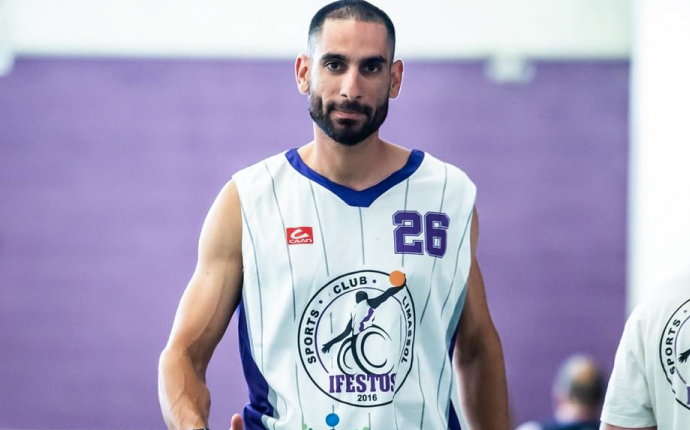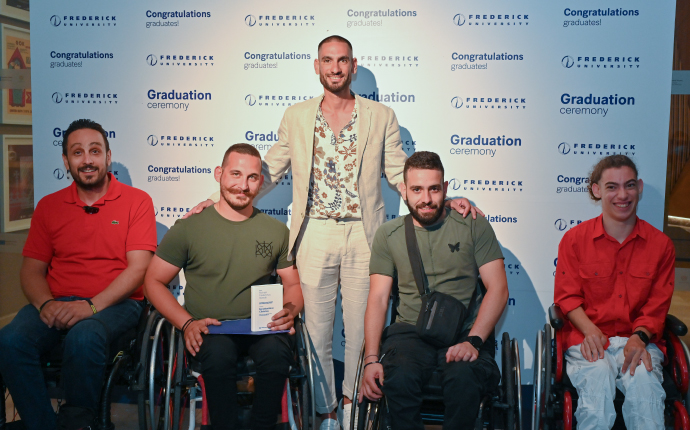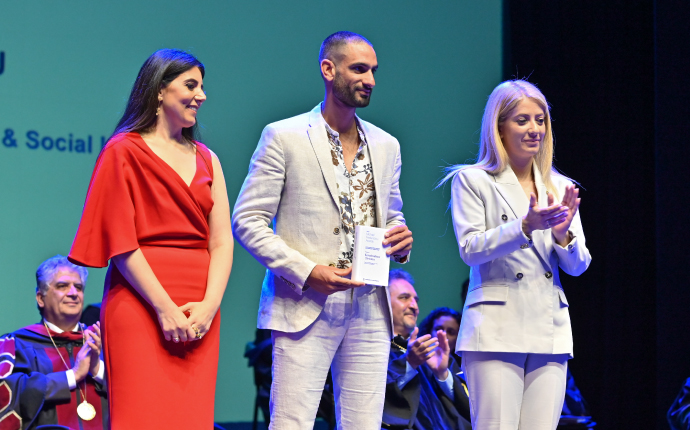
The Journey
To My Success
Constantinos Christou:
"To me, success is to become better every single day, and do things that are challenging"
When I was born, my parents were in the process of moving from Larnaca to Limassol. Since then and to date, my mom says “You’ve been on the move since”. She also keeps telling me I was born an athlete.
I was around 5 years old when I first started going to AGO, an afternoon sports activities class where I played tennis and football as well as other activities that were offered. At the age of 6, I told my dad that what I really wanted to do was play football at Apollonas FC. After a lot of intense conversations, he took me to the field and said: “This is where you’ll play”. And from that point on, whenever I set my mind on something, there is no way I will not achieve it. I kept playing for Apollonas FC till the age of 16.
During my school years, I was over-confident that sports was my call for life. My desire got even bigger when at some point I was challenged by one of my teachers who kept telling me that it was impossible to make the 400m run in a particular amount of time and that only one student in the entire school would have been able to make it. I thought to myself, “Great, another challenge!”. He asked that we run together and I crossed the finish line while the student who was more likely to win was left far behind. The teacher later said that the time I had achieved could grant me a win in the Greek national games. It was the same teacher who eventually convinced me to take up on athletics seriously. And so I did.
A day before the games, I got in an accident with the motorcycle. It meant the loss of a whole year of training! I was extremely disappointed, but I didn't give up. I continued working and training at the same time
I started athletics as soon as I was enlisted in the army. I took the national exams and managed to obtain a spot for the Sports Science program in Trikala. Eventually I decided not to pursue it because I didn't want to financially burden my parents with my studies, return to Cyprus and get a job earning little money. So, I started working at various jobs while training hard in order to be able to go to Newcastle on a scholarship. One of the jobs I did was working as a messenger. And at that point, an unexpected thing occurred: A day before the games, I got in an accident with the motorcycle. It meant the loss of a whole year of training! I was extremely disappointed, but I didn't give up. I continued working and training at the same time. I was training from 6 to 7 in the morning, then at 9 I would go to work and train again in the afternoon. That's how the years passed by. Then in 2016, when I had to take some courses on exercising, Frederick University showed up before me.
A friend of mine, seeing how dedicated I was on the subject, encouraged me to study at Frederick University. I started looking into it but soon realized that the only option I had was to study in Nicosia. That was especially difficult for me because I would have to stop working and at the same time, start renting. I was considering to study abroad, when one of the clients I had as a personal trainer, Mr. Dimitris, told me that Frederick University now offered a Sports Science program of study in Limassol. He arranged for an appointment for me with the Admissions Office and so I went and enrolled. Consequently, I slowly started studying while still working, that is, training the champion Antonis Aresti.
I got close with all of my professors, especially Dr Elena Papacosta, who is also my academic advisor. I have a good relationship with my professors who I feel they stand by me
The first year at the university was my best year both as a student and athlete. I won two medals during the Games of the Small States of Europe (GSSE) and I competed with the National team in European games. It was both a demanding and successful year for me, and it made me realize that once you set a goal, there is nothing holding you back from achieving it.
At the beginning of my studies, I was rather “aggressive” in the classroom because I thought that since I was older than the rest, I could claim more things. That was slightly awkward. I got close with all of my professors, especially Dr Elena Papacosta, who is also my academic advisor. I have a good relationship with my professors who I feel they stand by me. That’s important, I believe.
I always wanted to be an achiever. In the university, I wanted to be a good student, and in sports, I wanted to be a good athlete. During my studies, I was lucky enough to train Antonis Aresti, the former athlete who won two silver medals in the Beijing Paralympic Games in 2008, was named world champion at the New Zealand Games in 2011, and won numerous European awards. We participated together in the Rio Paralympic Games, where we won 6th place, while in 2017 we won the 3rd place in the world championship in London. We also managed to take the 11th place in the general ranking of 400m of the T47 category, at the Tokyo Paralympic Games in 2021, where he decided to finish his career. Working so intensively with this particular athlete, I began to gain a greater interest in Paralympics, which eventually led me to training the Ifestos wheelchair basketball team.
I have always been the goal-setter type of person. I write my goals down, I “see” them, and I don’t stop until I succeed
My involvement with Ifestos Limassol started after a random meeting I had with an old friend, Christos Loizou, who was a member of the team. Christos knew my experience with Antonis Aresti and suggested I should try training the team. So I met with the team, I really liked them and started training them. As simple as that. My first meeting with the team was rather weird because all that passion and energy I had in order to “help” turned out to be unnecessary. This is generally a wrong mindset that we have when we see a person on a wheelchair: We are thinking that we have to help them. All that impulsiveness is not that good and, trust me, people with disabilities do not need us as much as we think. If they need help, they ask for it. There is no pity, only understanding. This is what I learnt while working with them. 
I have always been the goal-setter type of person. I write my goals down, I “see” them, and I don’t stop until I succeed. The biggest goal of my life, the one I am working on right now, is the creation of an integrated center that covers all the needs of people with disabilities. For this reason, alongside my partner Maria Garpozi, we have created “Yparxo”, a non-profit Center for Education and Rehabilitation of Persons with Disabilities, which aims at the rehabilitation of people with disabilities and their activity in sports and the Paralympics.
I want the disabled people to understand that there is a place and way for them to do many things
We usually see that a disabled person desires to achieve his or her goals. Until they reach that point, they have to find a person to trust, to believe in them and get inspired by them. What I want is to be the mainspring of these people. To feel that at our "Yparxo” Center, they have the support to find what they want to do with work, their daily life or heir rehabilitation and be able to achieve it. We want to create the infrastructure to cover the needs of the disabled and their families, ranging from Sport Psychologists, to Psychologists for the parents, Speech Therapists, Occupational Therapists, Physiotherapists and Doctors. We want this Center to provide what would make them feel safe with us.
Besides the creation of “Yparxo”, there is another main goal I have, and it concerns the Paris Paralympic Games in 2024. My goal is for Cyprus to be represented by a team of more than ten people, and as the time passes, the team to grow bigger and bigger. I want the disabled people to understand that there is a place and way for them to do many things.
To me, success is to become better every single day, and do things that are challenging. I always enjoy finding things that no one else can do or thought of doing. Success for me is to outperform yourself. To overcome what the society thinks that is not possible. 

